|
|
|
Sort Order |
|
|
|
Items / Page
|
|
|
|
|
|
|
| Srl | Item |
| 1 |
ID:
155351
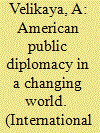

|
|
|
|
|
| Summary/Abstract |
TODAY, many countries rely on public diplomacy (PD) when dealing with expert communities and civil society in other countries: foreign policy is growing increasingly personalized all over the world making PD dealing with specific circles of foreign audiences a useful and very much needed instrument.
|
|
|
|
|
|
|
|
|
|
|
|
|
|
|
|
| 2 |
ID:
171664
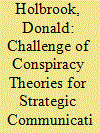

|
|
|
|
|
| Summary/Abstract |
Donald Holbrook highlights the role conspiracy theories play in relation to state and non-state strategic communications efforts that are hostile to Western security interests. Not only is their use and acceptance prevalent, but conspiracy theories also represent powerful rhetorical tools to justify indiscriminate or mass-scale aggression since they link shared grievances with alleged and purported networks of perpetrators, whose intent, secrecy, agency and connectedness are taken for granted.
|
|
|
|
|
|
|
|
|
|
|
|
|
|
|
|
| 3 |
ID:
141584
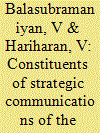

|
|
|
| 4 |
ID:
129670
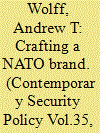

|
|
|
|
|
| Publication |
2014.
|
| Summary/Abstract |
NATO confronts four distinct public perception challenges: weak or varying public support for the alliance and its specific missions; a general lack of public awareness of the alliance's post-cold war transformation; diverging opinions on its proper role in the world; and parochial and domestic interests filtering into NATO's agenda. These various public relations challenges detract from alliance cohesiveness, impede mission performance, breed confusion and dissension about alliance aims, and raise questions about the proper operation of democratic governance within the alliance. Recent alliance communication efforts encompassing public diplomacy and strategic communications have failed to improve these public perception challenges. Instead, NATO should consider adopting a long-term branding strategy that focuses specifically on shaping the public's mental image of the alliance through the creation, promulgation, and management of a core message. Such a strategy has the potential to create a more consolidated alliance mandate that is easier for the public to understand and, ultimately, transforms the way NATO relates to its public.
|
|
|
|
|
|
|
|
|
|
|
|
|
|
|
|
| 5 |
ID:
110833
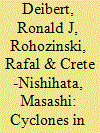

|
|
|
|
|
| Publication |
2012.
|
| Summary/Abstract |
While the rhetoric of cyber war is often exaggerated, there have been recent cases of international conflict in which cyberspace has played a prominent role. In this article, we analyze the impact of cyberspace in the conflict between Russia and Georgia over the disputed territory of South Ossetia in August 2008. We examine the role of strategic communications, information operations, operations in and through cyberspace, and conventional combat to account for the political and military outcomes of the conflict. The August 2008 conflict reveals some emergent issues in cyber warfare that can be generalized for further comparative research: the importance of control over the physical infrastructure of cyberspace, the strategic and tactical importance of information denial, the emergence of cyber-privateering, the unavoidable internationalization of cyber conflicts, and the tendency towards magnifying unanticipated outcomes in cyber conflicts - a phenomenon we call 'cyclones in cyberspace'.
|
|
|
|
|
|
|
|
|
|
|
|
|
|
|
|
| 6 |
ID:
164406
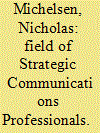

|
|
|
|
|
| Summary/Abstract |
Communication has long been accepted as integral to the conduct of international affairs. The role that discourses, ideas, norms, and narratives play at the systemic level of world politics has been examined extensively. Scholarly interest has now turned to how international actors use political communication tools to create and counter threats, such as propaganda, hybrid warfare, fake news, and election tampering, and it is often taken for granted that states are inferior to their challengers in these domains. To address this, ‘Strategic Communications’ has emerged as a mode of thought and practice promising to enhance state communication; encompassing long-established activities including public diplomacy, public relations, nation branding, and information operations. In this developing field, private sector professionals are increasingly being called on to support and advise governments. Particular attention has been paid to the ‘Big Data’ private companies may have access to, but there has been little IR research examining the experts seeking changes in how strategic communications is practised. Informed by elite interviews with communication professionals across the public-private space, this article sets out a research agenda to fill this gap, enhancing understanding of the expert relationships that shape international strategic communications.
|
|
|
|
|
|
|
|
|
|
|
|
|
|
|
|
| 7 |
ID:
154982
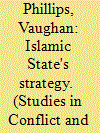

|
|
|
|
|
| Summary/Abstract |
To understand the Islamic State's strategy, we have to look at the way the group twins Maoist and post-Maoist strategies, previously considered strategically incompatible. By establishing a state that it claims to embody the Caliphate, it not only gains revenue and resources, but also generates a seductive “brand” with a compelling message that it “sells” via the Internet. This brand, based on Propaganda of the Deed, synergizes its physical and digital activities to create a virtuous circle that is very close to being self-sustaining. As such it represents a new insurgent model that corroborates the News Wars thesis.
|
|
|
|
|
|
|
|
|
|
|
|
|
|
|
|
| 8 |
ID:
179941
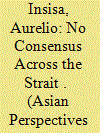

|
|
|
|
|
| Summary/Abstract |
After the 2016 elections, cross-Strait relations have fallen to their lowest point since the Third Strait Crisis. A proliferation of state-driven strategic narratives by both sides has since emerged. Against Beijing's narratives of "national rejuvenation," peaceful reunification, and "1992 Consensus," the Tsai administration has contraposed an image of Taiwan as a "beacon" of freedom and democracy in the Indo-Pacific. By tracing the tenets and the operationalization of Beijing and Taipei's strategic communications from the late 2000s to 2020, this article shows how Chinese and Taiwanese actors' reactions to the systemic pressure of a shifting East Asian regional order have progressively shaped cross-Strait communicative dynamics, severely constraining the range of options that could overcome the current impasse.
|
|
|
|
|
|
|
|
|
|
|
|
|
|
|
|
| 9 |
ID:
102987
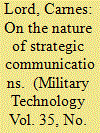

|
|
|
| 10 |
ID:
179940
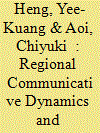

|
|
|
|
|
| Summary/Abstract |
Asian states are increasingly finding strategic communications to be an important tool of foreign and defense policy. Strategic communications involve coordinated messaging to achieve political objectives, utilizing words, actions, images, and various forms of signaling or symbols with the intention of influencing or persuading the target audiences. Such purposeful, coordinated, and targeted communications necessarily give rise to action-reaction dynamics that may have a tangible impact on interstate relations and the balance of power. How, then, do states in Asia employ such messaging activities in order to achieve influence? What dynamics are created by the employment of strategic communications by states in the region, and how do these affect intense greatpower rivalries and competition for leadership of international norms and in institutions in the region? The contributors to this special section address a series of common questions as the analytical framework for investigating how states conceptualize and utilize strategic communications to further national interests vis-à-vis their target states and domestic populace. The articles explore the communicative dynamics of strategic communications and how they impact perceptions of threat and the cost-benefit calculus associated with certain actions, such as escalation or de-escalation of tensions. This special section demonstrates the ways in which strategic communications are an integral element of an ongoing power transition in Asia and thus shape international relations in the region in critical ways.
|
|
|
|
|
|
|
|
|
|
|
|
|
|
|
|
| 11 |
ID:
179943
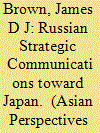

|
|
|
|
|
| Summary/Abstract |
Russia has been accused of weaponizing information to exert influence over the political systems and publics of countries in Europe and North America. However, is Moscow engaged in comparable activities in Japan? Given Japan's status as the United States' main ally in East Asia and the history of Soviet influence operations in the country, Japan is a logic target. Yet, to date, no detailed study has been conducted into Russia's use of information tools toward Japan. To fill this gap, in this article I examine Russia's contemporary strategic communications toward Japan in five areas: public diplomacy, Japanese mainstream media, Japanese social media, Russian state media in the Japanese language, and Russia's use of Japanese agents of influence. I also assess the extent to which these activities pose a threat to Japanese security by comparing Russia's activities via both a benign and malign model of strategic communications. This also facilitates comparisons with Russia's actions in other countries. Having identified contrasts in the approach taken by Russia toward Japan and Western states, the article concludes by discussing explanations for these differences.
|
|
|
|
|
|
|
|
|
|
|
|
|
|
|
|
| 12 |
ID:
171662
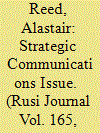

|
|
|
|
|
| Summary/Abstract |
The weaponisation of communications by state and non-actors has emerged as one of the most pressing security concerns facing Western democracies. Over the past decade, the communication threat from extremist organisations has been transformed by the rise of the Islamic State (IS). While the use of propaganda is nothing new, IS has employed strategic communications more successfully than earlier extremist organisations, and effectively exploited the emergence of new technologies to disseminate its message directly. But the reach of this new approach to communication goes far beyond IS, with the threat from other extremist movements such as far-right and nationalist groups becoming increasingly challenging. This step-change is, of course, not limited to non-state actors. States have also sought to exploit the influencing power of new technology to conduct disinformation campaigns, such as Russian interference in the US elections. Thus, liberal democracies face multiple threats from malign influencing activities, and the nature and perceptions of these threats have been transformed by the emergence of new technology, in particular social media. As a result, strategic communications needs to become an increasing priority, and while the threats are diverse, they do not exist in isolation, and our response needs to be both strategic and comprehensive.
|
|
|
|
|
|
|
|
|
|
|
|
|
|
|
|
| 13 |
ID:
176191
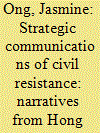

|
|
|
|
|
|
|
|